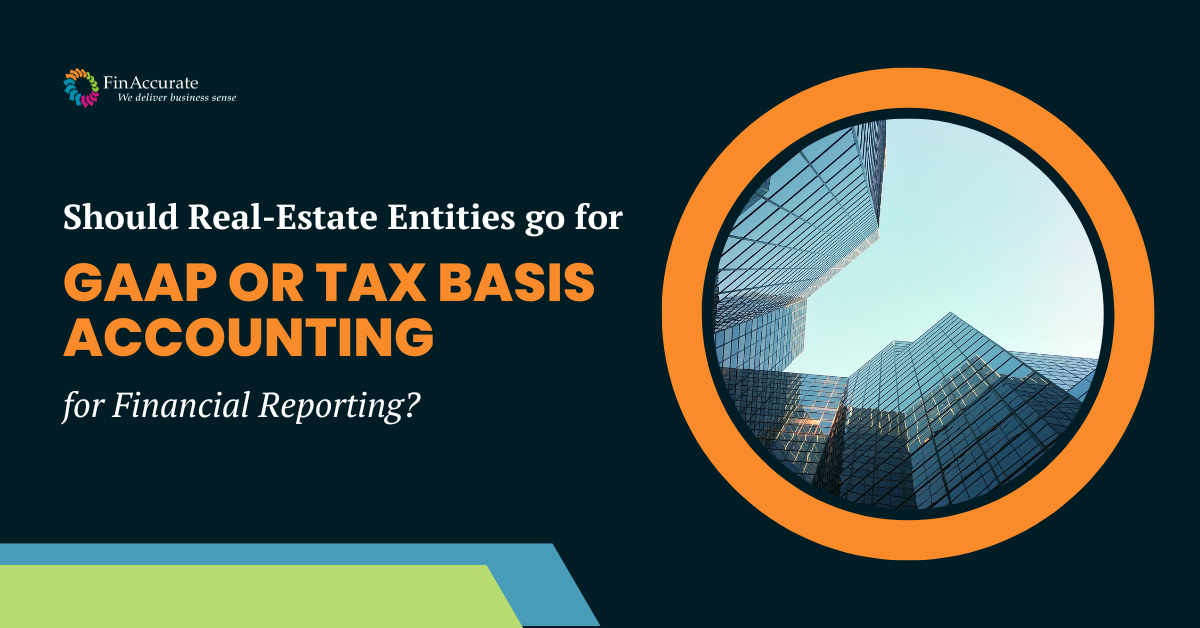When real estate companies present their financial results, they use two main ways: GAAP and the income tax basis. These methods can show quite different financial results. If a real estate company doesn’t have to give GAAP financial statements, like to a bank, partner, or investor, they might use an income tax basis instead.
If your company chooses income tax-based accounting, it can save you time and money for year-end reporting. Now, let’s explore both the methods to decide which ones are best for you.
Read More – Hidden Tax Consequences of Real Estate Foreclosures
Understanding Bookkeeping in Real Estate: GAAP vs. Federal Income Tax Basis
1. GAAP: Simplifying Financial Reporting
The go-to financial reporting standard in the US is known as GAAP. The Financial Accounting Standards Board (FASB) sets its rules. Public companies must follow GAAP under the watchful eye of the Securities and Exchange Commission (SEC). Many private lenders also prefer this method since it’s consistent and familiar.
GAAP sticks to accrual accounting, meaning income and expenses are recorded when they happen, not when cash changes hands.
In simple terms, GAAP leans on conservatism. This makes sure that revenue and expenses match up properly in each reporting period. It stops companies from boosting profits and asset values just to fool investors and lenders.
2. Tax-Basis Reporting: Tax Rules in Action
Tax-basis financial reporting springs from the IRS tax code. It’s used for tax purposes and highlights a business’s cash transactions.
GAAP compliance can be time and money-consuming, depending on the assurance level needed in financial statements. Some small private businesses choose a different path. They use a unique reporting method, often the income-tax-basis format.
Tax-basis statements use the same approach as filing federal income tax returns. Unlike GAAP, tax law prefers recognizing income early and holds back expense deductions until all requirements are met.
Differences Between Income Tax Basis and GAAP in Real Estate
Here’s a breakdown of key distinctions between income tax basis and GAAP for real estate, highlighting potential time and cost benefits for real estate businesses.
| Aspect | Income Tax Basis | GAAP |
| Depreciation | Assets depreciated per IRS rules | Assets depreciated based on estimated useful lives |
| Accounts Receivable | Bad debts expensed when worthless | Bad debt policy with estimated expense allowance |
| Acquisitions | Purchase price allocated to real/personal property | Additional allocation for lease intangibles and costs |
| Start-up Costs | Capitalized | Expensed |
| Rental Income | Recognized when accrued/collected | Straight-line recognition over lease term (GAAP) |
| Impairment | No mandatory impairment review | Mandatory impairment review (GAAP) |
| Derivative Instruments | No fair value recording | Fair value recording with potential hedge accounting |
| Variable Interest Entities | Not consolidated | Consolidation required (GAAP) |
| Reporting Revenue and Expenses | Report when earned/incurred | Report when cash is received/paid out |
| Income Statement Terminology | Revenues, expenses, net income | Gross income, deductions, taxable income |
| Capitalization and Depreciation | Capitalize, systematic depreciation | Depreciate under MACRS, shorter lives |
| Fixed Asset Impairment | Assess useful lives, impairment losses | No impairment deductions, different rules |
| Inventory, Pensions, Leases | Reporting differences exist | Reporting differences exist |
| Allowances (e.g., bad debts) | Record under GAAP | Generally not permitted under tax law |
| Deductions (e.g., penalties) | Deductible under GAAP | Prohibited as deductions under tax law |
Why Opt for Income Tax Accounting in Real Estate?
Choosing income tax accounting is simpler than GAAP, reducing both internal and CPA workload. Unlike GAAP, it avoids time-consuming rules and reporting.
Consistency is another plus. With income tax accounting, your financial statements and tax returns align. No need to juggle two separate sets of records.
This method also benefits stakeholders. Lenders and others grasp your economic results better. Income tax basis mirrors cash flow mindset and tax priorities in real estate. For instance, lease cash flow appears on financial statements.
In essence, by adopting the income tax approach, real estate companies streamline their bookkeeping, enhance clarity, and reflect cash flow realities.
Read More – How to Improve Your Construction Company’s Profitability
Choosing the Right Accounting Method for Your Real Estate Business
When it comes to using the income tax basis accounting method, the answer varies.
Publicly traded companies must follow GAAP reporting, and businesses with institutional investors will likely need to do the same. However, if you’re not bound by specific regulations, you might find the income tax basis method advantageous.
Surprisingly, your lenders might prefer income tax basis financials. They often grasp this method better than intricate GAAP rules. Just talk to your lender about it. You should also discuss whether any changes are needed for your agreements.
The main point is to understand what your financial statement users require. Then, decide if income tax basis accounting meets those needs effectively.
Comparing How Real Estate Income is Reported: GAAP vs. Tax Basis
When real estate companies share their financial results, they follow either GAAP or the income tax basis of accounting. These methods can show quite different financial outcomes. If a real estate company isn’t obligated to provide GAAP financial statements, using the income tax basis might better suit their needs.
Different Ways of Counting Income: GAAP vs. Tax Basis
Under GAAP’s new rules (ASC 606), rental revenue isn’t affected significantly by the change, but property management and significant fees could be impacted. However, income tax basis doesn’t adopt these new rules. Deciding to use the new GAAP standards (for 2019 revenue and potentially delayed 2021 leases) might not always add value for financial statement users.
Recognizing Rental Income: How It Differs
According to GAAP, rental income is spread evenly throughout the lease period (straight-line method). Commercial leases often include rent credits, holidays, and escalation clauses. For instance, if a tenant has a 6-month rent-free period in a 10-year lease with $50,000 monthly rent, the landlord reports year one income under GAAP as follows:
- $50,000 per month * 114 months (excluding 6 months free) = $5,700,000 total income
- $5,700,000 / 120 months = $47,500 monthly income (straight-line)
- $47,500 * 12 months = $570,000 year one GAAP rental income
The difference between recognized GAAP income of $570,000 and received revenue of $300,000 ($50,000 * 6 months) is recorded as a deferred rent asset in year one.
However, under income tax basis, it’s simpler: year one rental income is $300,000 (assuming all billed rent was received), matching the cash flow. Income tax basis records revenue upon receiving amounts.
Read More – Building a Resilient Supply Chain in Your Business
Conclusion
Choosing Tax Basis for real estate financial reporting simplifies things compared to GAAP. It makes your financials match your cash flow and business reality. But before switching to Tax Basis, talk to your lenders, investors, and accountants to make sure it’s allowed in your agreements and suits your financial statement users better.




